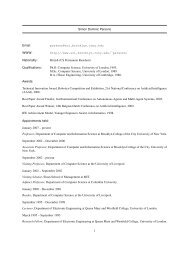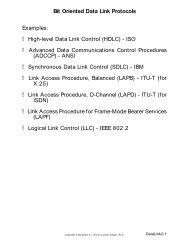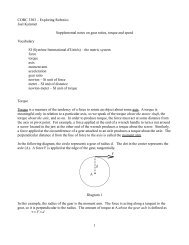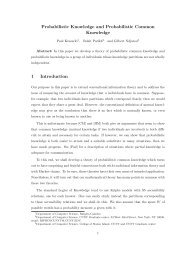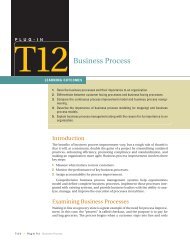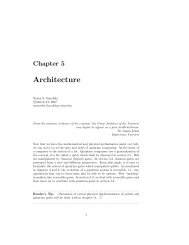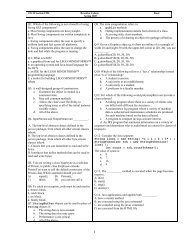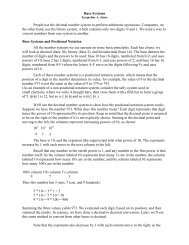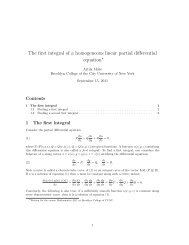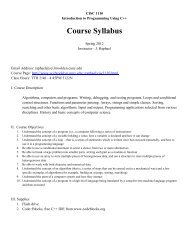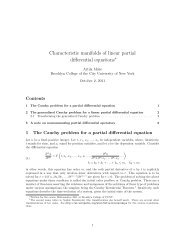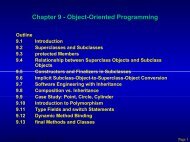*302 Greig and Others v Insole and Others 1977 G. No. 22461977 J ...
*302 Greig and Others v Insole and Others 1977 G. No. 22461977 J ...
*302 Greig and Others v Insole and Others 1977 G. No. 22461977 J ...
Create successful ePaper yourself
Turn your PDF publications into a flip-book with our unique Google optimized e-Paper software.
[1978] 1 W.L.R. 302 Page 35<br />
[1978] 1 W.L.R. 302 [1978] 3 All E.R. 449 (1978) 122 S.J. 162 [1978] 1 W.L.R. 302 [1978] 3 All E.R. 449 (1978)<br />
122 S.J. 162<br />
(Cite as: [1978] 1 W.L.R. 302)<br />
ising rights attached thereto which were still vested<br />
in it) would still have constituted *340<br />
assets in its h<strong>and</strong>s which were valuable assets,<br />
in the sense that it could reasonably have expected<br />
to be able to sell, lease or licence them to<br />
one or more companies, inside or outside its own<br />
group, which would be in a better financial position<br />
to exploit them. The contracts in question were<br />
fully assignable. If the defendants had succeeded in<br />
persuading merely one or two of the players to<br />
withdraw from their contracts, this could have cast<br />
doubts on the viability of the whole World Series<br />
Cricket project, with consequent risks of incalculable<br />
loss to the company which had entered into<br />
substantial commitments both with the players involved<br />
<strong>and</strong> to other persons in connection with the<br />
project.<br />
In the circumstances World Series Cricket has, in<br />
my judgment, established the likelihood of more<br />
than nominal damage resulting to it, if the ICC's<br />
acts of interference with its contracts with players<br />
are successful.(6)<br />
Justification<br />
I have already made it plain that good faith <strong>and</strong> absence<br />
of malice on the part of a defendant do not as<br />
such provide any defence to an action based on inducement<br />
of breach of contract. The authorities,<br />
however, show that, even if all the other ingredients<br />
of the tort are present in a given case, the defendant<br />
may still escape liability, if he can in the particular<br />
circumstances show sufficient “justification” in law<br />
for what he did.<br />
Romer L.J. in Glamorgan Coal<br />
Co. Ltd. v. South Wales Miners' Federation [1903]<br />
2 K.B. 545 , 573, pointed out that it would<br />
be extremely difficult, even if it were possible, to<br />
give a complete <strong>and</strong> satisfactory definition of<br />
“sufficient justification” <strong>and</strong> that most attempts to<br />
do so would probably be mischievous. He agreed<br />
with what Bowen L.J. had said in Mogul<br />
Steamship Co. Ltd. v. McGregor, Gow & Co.<br />
(1889) 23 Q.B.D. 598 , 618, namely, that<br />
when difficulty might arise in deciding whether<br />
there was sufficient justification or not, “the good<br />
sense of the tribunal which had to decide would<br />
have to analyse the circumstances <strong>and</strong> to discover<br />
on which side of the line each case fell” Romer L.J.<br />
continued, at p. 574:<br />
“I will only add that, in analysing or<br />
considering the circumstances, I think that regard<br />
might be had to the nature of the contract broken;<br />
the position of the parties to the contract; the<br />
grounds for the breach; the means employed to procure<br />
the breach; the relation of the person procuring<br />
the breach to the person who breaks the contract;<br />
<strong>and</strong> I think also to the object of the person in procuring<br />
the breach. But, though I deprecate the attempt<br />
to define justification, I think it right to express<br />
my opinion on certain points in connection<br />
with breaches of contract procured where the contract<br />
is one of master <strong>and</strong> servant. In my opinion, a<br />
defendant sued for knowingly procuring such a<br />
breach is not justified of necessity merely by his<br />
showing that he had no personal animus against the<br />
employer, or that it was to the advantage or interest<br />
of both the defendant <strong>and</strong> the workman that the<br />
contract should be broken. I take the following<br />
simple case to illustrate my view. If A wants to get<br />
a specially good workman, who is under contract<br />
with B, as A knows, <strong>and</strong> A gets the workman to<br />
break his contract to B's injury by giving him higher<br />
wages, it would not, in my opinion, afford A a<br />
defence to an action against him by B that he could<br />
establish he had no personal *341<br />
animus against B, <strong>and</strong> that it was both<br />
in the interest of himself <strong>and</strong> of the workman that<br />
the contract with B should be broken. I think that<br />
the principle involved in this simple case, taken by<br />
me by way of illustration, really governs the<br />
present case. For it is to be remembered that what A<br />
has to justify is his action, not as between him <strong>and</strong><br />
the workman, but as regards the employer B.”<br />
Romer L.J., on the facts of that particular case went<br />
on to hold, at p. 576, that there was no sufficient<br />
© 2011 Thomson Reuters.



